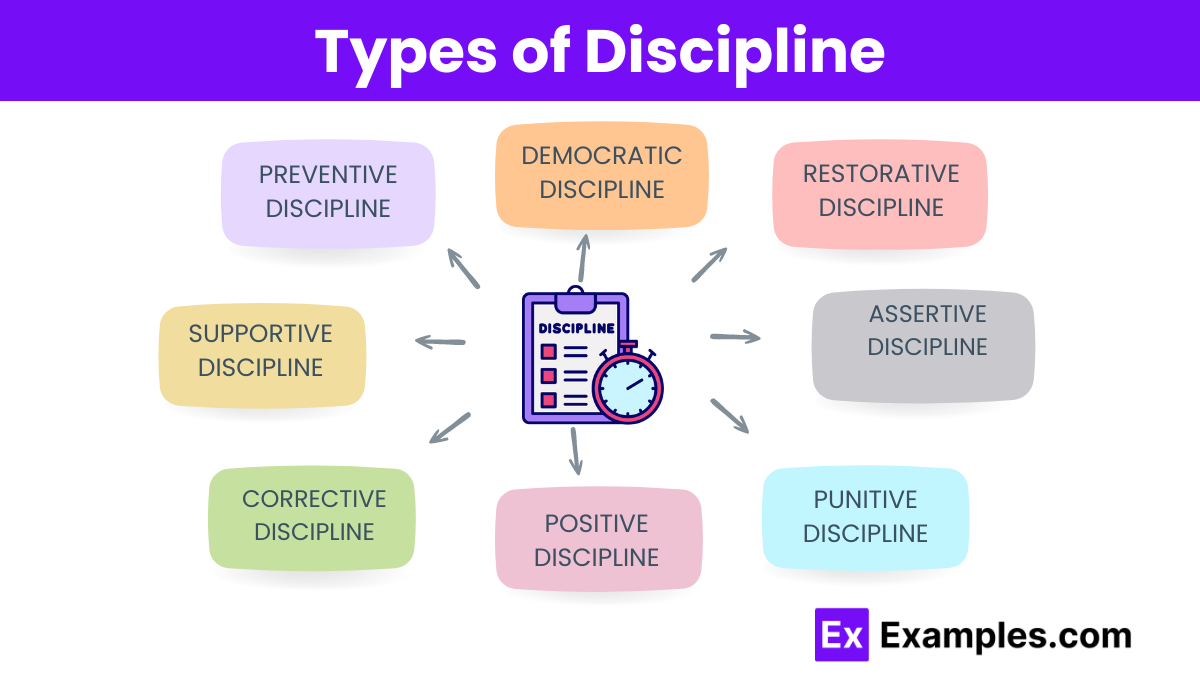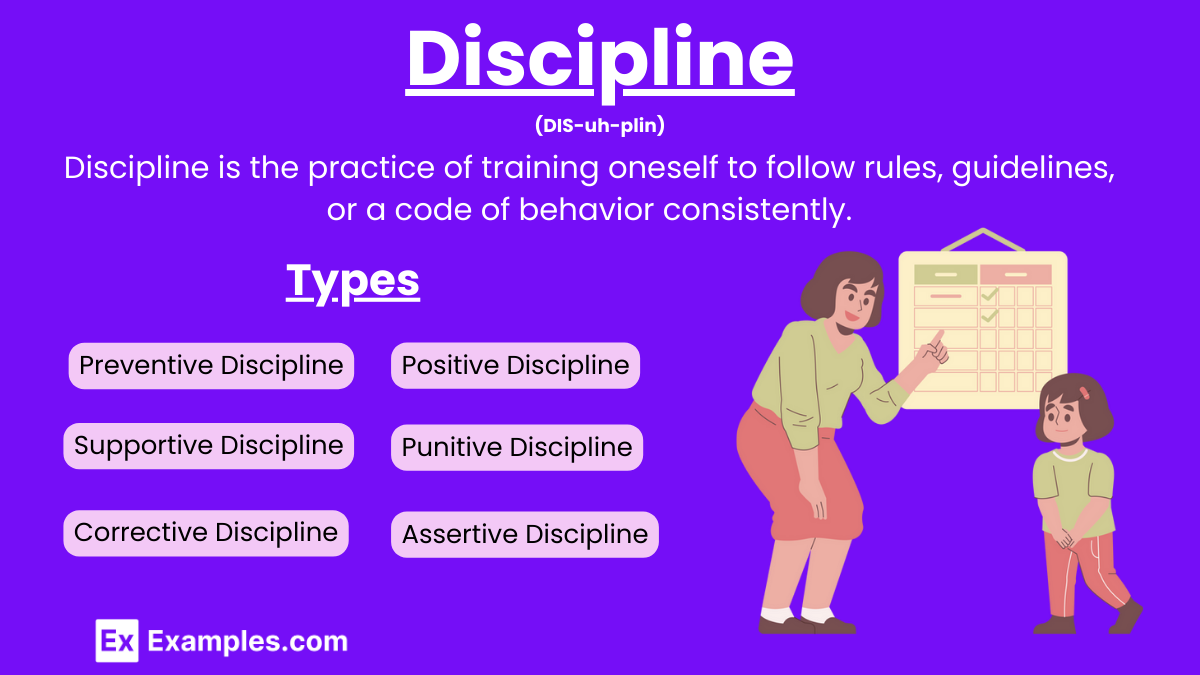15+ Discipline Examples to Download
Discipline is the practice of training oneself to follow rules, guidelines, or a code of behavior consistently. It involves self-control, responsibility, and the ability to stay focused on long-term goals despite challenges or distractions. It helps individuals make better decisions, achieve their objectives, and build a structured and balanced life. In a professional setting, adhering to business plan guidelines and HR guidelines ensures that both organizational and employee behaviors align with the company’s standards and goals. Writing an essay on discipline can explore these concepts in-depth, highlighting their importance in various contexts. Additionally, a disciplinary report documents instances where discipline needs to be enforced, helping to maintain order and address any deviations from expected conduct.
What is Discipline?
Examples of Discipline
- Arriving on time for work or appointments
- Completing assignments before deadlines
- Maintaining a consistent study schedule
- Following a regular exercise routine
- Sticking to a healthy diet
- Avoiding procrastination
- Keeping a clean and organized workspace
- Adhering to a budget and managing finances responsibly
- Practicing good time management
- Setting and achieving personal goals
- Staying focused during work or study sessions
- Following through on commitments
- Maintaining a daily meditation or mindfulness practice
- Limiting distractions during work hours
- Upholding ethical standards and integrity
Types of Discipline

1. Preventive Discipline
Preventive discipline involves strategies and practices that aim to prevent misbehavior before it occurs. This type includes setting clear rules, expectations, and routines to create a structured environment.
2. Supportive Discipline
Supportive discipline focuses on providing guidance and encouragement to help individuals follow the established rules. This type includes positive reinforcement, praise, and constructive feedback to motivate good behavior.
3. Corrective Discipline
Corrective discipline is used to address and correct misbehavior when it occurs. This type includes implementing consequences such as time-outs, loss of privileges, or additional tasks to deter future misbehavior.
4. Positive Discipline
Positive discipline emphasizes teaching and reinforcing desirable behaviors rather than punishing negative ones. This type includes methods like modeling appropriate behavior, using praise and rewards, and offering choices to empower individuals.
5. Punitive Discipline
Punitive discipline involves imposing penalties or punishments to discourage unwanted behavior. This type can include detention, suspension, or other forms of punishment intended to enforce compliance with rules.
6. Assertive Discipline
Assertive discipline is a structured, firm, and consistent approach to managing behavior. This type involves clear communication of rules, consistent enforcement of consequences, and assertive communication techniques to maintain authority.
7. Restorative Discipline
Restorative discipline focuses on repairing harm and restoring relationships after a rule has been broken. This type includes practices like mediation, conflict resolution, and restitution to address the impact of the misbehavior.
8. Democratic Discipline
Democratic discipline involves involving individuals in the decision-making process regarding rules and consequences. This type promotes a sense of ownership and responsibility, encouraging cooperation and mutual respect.
Importance of Discipline in Life
- Achieving Goals: Discipline helps in setting and achieving personal and professional goals by maintaining focus and consistency.
- Time Management: It enables effective management of time, leading to increased productivity and reduced stress.
- Self-Control: Discipline fosters self-control, helping individuals make better decisions and avoid impulsive behaviors.
- Improved Health: A disciplined lifestyle promotes regular exercise, healthy eating, and adequate rest, contributing to overall well-being.
- Personal Growth: It encourages continuous learning and self-improvement, leading to personal and professional development.
- Financial Stability: Discipline in financial management helps in saving money, reducing debt, and making informed spending decisions.
- Enhanced Relationships: It promotes respect, responsibility, and reliability, strengthening personal and professional relationships.
- Stress Reduction: By providing structure and predictability, discipline reduces anxiety and helps manage stress effectively.
Discipline Quotes
- “Discipline is the bridge between goals and accomplishment.” – Jim Rohn
- “Without discipline, there’s no life at all.” – Katharine Hepburn
- “Success is nothing more than a few simple disciplines, practiced every day.” – Jim Rohn
- “Discipline is choosing between what you want now and what you want most.” – Abraham Lincoln
- “With self-discipline most anything is possible.” – Theodore Roosevelt
- “Discipline is the soul of an army. It makes small numbers formidable; procures success to the weak, and esteem to all.” – George Washington
- “The only discipline that lasts is self-discipline.” – Bum Phillips
- “Self-discipline begins with the mastery of your thoughts. If you don’t control what you think, you can’t control what you do.” – Napoleon Hill
- “Discipline is the refining fire by which talent becomes ability.” – Roy L. Smith
- “Discipline and concentration are a matter of being interested.” – Tom Kite
The Role of Discipline in Achieving Goals
- Focus and Concentration: Discipline helps maintain focus on tasks, avoiding distractions and ensuring that efforts are directed toward goal achievement.
- Consistency: Regular, disciplined actions build momentum and progress, making it easier to reach long-term goals.
- Time Management: Effective discipline involves planning and prioritizing tasks, leading to better time management and productivity.
- Perseverance: Discipline fosters resilience, helping individuals persist through challenges and setbacks.
- Self-Control: Practicing discipline enhances self-control, reducing impulsive behaviors that can derail progress.
- Motivation: A disciplined approach keeps motivation high by creating a clear roadmap and sense of purpose.
- Accountability: Discipline instills a sense of responsibility, holding individuals accountable for their actions and commitments.
- Skill Development: Consistent practice and disciplined effort lead to the development and refinement of skills necessary for achieving goals.
Uses of Discipline
- Personal Development: Discipline is crucial for personal growth and self-improvement. It helps individuals set and achieve goals, develop good habits, and overcome procrastination, leading to a more fulfilling and productive life.
- Academic Success: Students with strong discipline are better able to manage their time, complete assignments, and prepare for exams. This leads to higher academic performance and a deeper understanding of their studies.
- Career Advancement: In the workplace, discipline enables employees to meet deadlines, maintain high standards of work, and continually develop their skills. This is essential for career growth and achieving professional goals.
- Health and Fitness: Discipline is vital for maintaining a healthy lifestyle. It helps individuals adhere to exercise routines, follow balanced diets, and avoid harmful behaviors, leading to improved physical and mental health.
- Financial Management: Discipline is essential for managing finances effectively. It enables individuals to budget, save, invest wisely, and avoid impulsive spending, leading to financial stability and security.
- Time Management: Discipline allows individuals to prioritize tasks, avoid distractions, and use their time efficiently. Effective time management leads to increased productivity and the ability to balance various responsibilities.
- Building Strong Relationships: Discipline in relationships involves maintaining trust, showing respect, and fulfilling commitments. This fosters healthy, lasting relationships with family, friends, and colleagues.
- Achieving Long-Term Goals: Discipline is key to pursuing and achieving long-term goals. It helps individuals stay focused, persist through challenges, and remain committed to their objectives over time.
Tips for Developing Discipline
- Set Clear Goals: Define specific, achievable goals to provide direction and motivation.
- Create a Routine: Establish a daily schedule that includes time for work, exercise, and relaxation to build consistency.
- Prioritize Tasks: Identify the most important tasks and focus on completing them first.
- Break Tasks into Smaller Steps: Divide larger tasks into smaller, manageable steps to make them less overwhelming.
- Eliminate Distractions: Minimize interruptions by creating a conducive environment for focused work.
- Use Reminders and Alarms: Set reminders and alarms to stay on track with your schedule and tasks.
- Stay Organized: Keep your workspace and materials organized to reduce stress and save time.
- Practice Self-Control: Develop the ability to resist temptations and stick to your commitments.
- Stay Accountable: Share your goals with a friend or mentor who can help you stay accountable.
- Reward Yourself: Celebrate small achievements and reward yourself for maintaining discipline.
What are the benefits of discipline?
Discipline leads to improved focus, productivity, goal achievement, and better time management.
How does discipline relate to success?
Discipline enables consistent effort, helping individuals achieve their goals and succeed in various aspects of life.
Can discipline be taught?
Yes, discipline can be taught through consistent practice, setting expectations, and using positive reinforcement.
What is the difference between self-discipline and external discipline?
Self-discipline is internal self-control, while external discipline is imposed by others, such as parents, teachers, or employers.
How does discipline affect mental health?
Discipline improves mental health by reducing stress, enhancing focus, and promoting a sense of control and accomplishment.
What role does discipline play in education?
Discipline in education helps students stay focused, complete assignments, and develop good study habits.
How can parents instill discipline in children?
Parents can instill discipline by setting clear rules, being consistent, and using positive reinforcement and appropriate consequences.
What are common discipline techniques?
Common techniques include positive reinforcement, time-outs, setting clear rules, and consistent consequences for misbehavior.
How can I maintain discipline at work?
Set clear goals, manage your time effectively, prioritize tasks, and stay focused to maintain discipline at work.
What is the role of discipline in sports?
Discipline in sports helps athletes follow training regimens, stay focused during competitions, and improve their skills.



